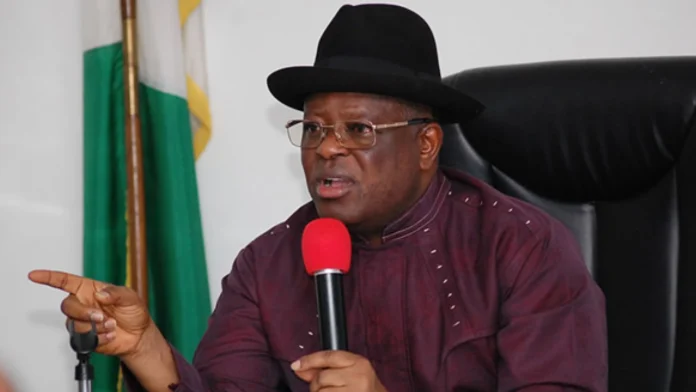By Emmanuella Oghenetega
The Minister for Works, Engr. David Umahi has reiterated that the availability of good road network is instrumental to achieving food security, ending poverty, improving security, enhancing economic growth and job creation.
In a statement signed by the Director, Press and Public Relations, Mohammed A. Ahmed, it was revealed that Umahi made the remarks while opening a two-day retreat organised for highways engineers and management staff of the Ministry with the theme, “Ensuring Delivery of Mr. President’s Agenda on Road Infrastructural Development” in Abuja.
According to Engr. Umahi, the massive infrastructural development embarked upon by the present administration across the entire six geo-political zones of the country is premised on stimulating the economy and improving the lives of the citizenry.
He re-affirmed the present administration’s commitment towards the reconstruction and rehabilitation of failing major highways across the zones, which will provide robust road infrastructure, as well as alleviate the sufferings of the citizens.
He also added that the retreat, which is aimed at enhancing optimum service delivery, efficiency, and unity in the delivery of road projects, nationwide, was expected to help participants ensure that the government got value for money expended on all projects.
While urging participants, especially the Ministry’s supervisory staff, to make the best use of the retreat to sharpen and improve their technical capabilities, he expressed optimism that they would acquire enough resources to help in delivering Mr. President’s eight-point agenda.
The Minister, who earlier maintained that bad roads were tantamount to keeping people in prison, as it hinders their movement, also called on highway engineers to change their modus operandi and work professionally, imbibing internationally recommended engineering standards and practices, to achieve the objectives of the Renewed Hope Agenda of Mr. President.
He directed that henceforth, contractors must mobilise to the site before requesting for mobilisation fee. Acknowledging the need for continuous capacity building for engineers, as an enabler for improvement in service delivery, he promised that such exercises would be institutionalised.
He, as well, directed all Federal Controllers of Works (FCW) to dismantle all speed calming devices/measures (speed breakers or bumps) on Federal highways in their respective states, insisting that there was nothing wrong in mounting such bumps but there should be approval and standard design and specifications guiding such endeavours.
In his goodwill message, the Permanent Secretary, Federal Ministry of Works, Engr. Olufunsho Adebiyi, thanked and welcomed the ministers for approving, as well as gracing the occasion.
He called for rapid transformation in service delivery in the road sector. The Permanent Secretary, however, formally presented to the Minister, a team of transformed engineers, who were willing to support the government achieve its Renewed Hope Agenda.
The Minister of State for Works, Muhammadu Bello Goronyo, eulogised the personality of the minister, whom he revered and referred to as a go-getter, intelligent, hardworking and highly professional.
He expressed gratitude to all stakeholders for their collaborative efforts in ensuring the success of the present administration, particularly in the provision of critical road infrastructure.
The Chairman of the House Committee on Works, Hon, Akin Alabi enjoined the Ministry to put in more effort on the roads work for the citizens, while the Chairman, Senate Committee on Works, Sen. Mpigi Barinada, called on the need to engage the members of the National Assembly (NASS) to ascertain that correct appropriation is made to accommodate all Nigerian roads.
He concluded by saying that the good works of the Ministry were an indication of support for Mr. President’s Agenda.
The retreat was facilitated by a panel of experts delivering insightful presentations on critical topics.
The panelists included the Permanent Secretary of the Ministry, the Director, Highways, Construction and Rehabilitation, Engr. Clement Ogbuagu, representative of the Chairman, Economic and Financial Crimes Commission (EFCC), Mr. Francis Useni, the Chairman of the FCT Civil Service Commission, Engr. Emeka Eze and retired directors from the Ministry such as Engineers Bala Danshehu, Bola Aganaba, J. A. Yusuf, A. A. Adebiyi and Olufemi Oyekanmi.
The sessions covered Compliance with Procurement Laws, Prudent Use of Resources, Project Planning and Alignment with President Tinubu’s Eight-Point agenda.
Discussions were centred on the composition of the Site Management Team; Project Planning; Resolving Bill 1; Direct Labour Policy; Inter Relationship between Engineers; Adherence to the Rules of Law and lastly, Funding of Projects.
It was agreed that the ministry should return to its original structure; waiver for recruitment of young engineers is to be pursued to bridge the gap of shortage of staff; there is no free money in Bill 1 anymore; the issue of direct labour was stepped down, as extant laws do not support it, more so, to avoid conflict of interest with the Federal Emergency Road Management Agency (FERMA).
It was rather agreed that FERMA should be strengthened to effectively carry out its mandates. The Ministry was advised to lobby for the establishment of a Federal Highways Authority; as participants were admonished to eschew backbiting and learn to bond with each other, as well as to forgive one another.
As takeaways from the retreat, participants were asked to reduce the use of emergency contracts; publish all contracts on the Ministry’s websites, including the names of the contractors, and value for money expended on every project; ensure that effective from 2025, categorisation of contractors will start and no longer portfolio or envelop contractors.
“To avoid unnecessary embarrassment, Officers need to apply extant rules in discharging their duties. The year 2025, being a year for enhanced performance for Mr. President, priority projects will be tracked by the second quarter of 2026, which should be ready for commissioning.”
Participants also were urged to ensure that Nigeria roads are motorable, especially that of Abuja – Kaduna, a vital artery linking the South to the North of the country. Civil Servants were, as well as urged to guide and support politicians in performing their jobs.


